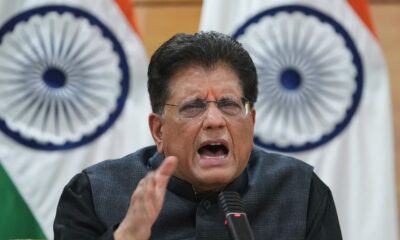Politics
Nationwide ‘No Kings’ Protests Challenge Trump’s Leadership

Demonstrations under the banner of “No Kings” took place across the United States on Saturday, reflecting widespread discontent with the leadership of President Donald Trump. Organizers reported over 2,600 rallies planned in various cities, representing a mobilization against what they perceive as authoritarian tendencies from the Trump administration. This marks the third major protest since Trump’s return to the White House, coinciding with a government shutdown that has raised concerns about the balance of power in the country.
The protests unfolded as Trump was away at his Mar-a-Lago residence in Florida. In a recent interview with Fox News, he responded to claims of being referred to as a king, stating, “I’m not a king.” The protests drew sharp criticism from the Republican Party, who labeled the events as “Hate America” rallies.
Growing Opposition Movement
Organizers view this latest wave of protests as a critical juncture for unifying opposition against the administration. Prominent figures such as Senate Leader Chuck Schumer and Independent Senator Bernie Sanders participated, emphasizing the need for collective action against policies they consider detrimental to democracy. Ezra Levin, co-founder of Indivisible, expressed that “there is no greater threat to an authoritarian regime than patriotic people-power.”
As protests unfolded in major cities and even in select European locations, participants waved flags and chanted slogans, showcasing a global dimension to the opposition movement. Organizers noted that the rallies were planned within a one-hour drive for most Americans, aiming to maximize participation.
Concerns Over Security and Law Enforcement
Some participants voiced apprehension about the security response to the protests. Retired doctor Terence McCormally, who planned to join fellow demonstrators at Arlington National Cemetery, expressed concerns over the recent deployment of the National Guard. He stated his unease, saying, “I really don’t like the crooks and conmen… while they are killing and hurting millions of people with bombs.”
Republican leaders have characterized the protests as extreme, dismissing attendees as radicals. House Speaker Mike Johnson referred to the gatherings as a “Hate America rally,” warning that they represented fringe elements within the political spectrum. In contrast, Democrats like Sanders countered this narrative, framing the rallies as a celebration of patriotism and constitutional values.
Democrats are currently facing pressure regarding the ongoing government shutdown, which has now lasted 18 days. They have refrained from voting on legislation to reopen the government until funding for health care is included. This shutdown, they argue, is a means to challenge Trump’s authority and restore balance among the branches of government.
The situation marks a significant shift from just a few months ago, when Democrats struggled to find their footing in the face of Trump’s presidency. The previous protests against Trump in April and June had seen participation numbers of 1,300 and 2,100 registered locations respectively, indicating a growing momentum in the opposition movement.
As the rallies took place, House Democratic Leader Hakeem Jeffries criticized the Republicans’ portrayal of the events. He reminded the public that the real threat to democracy was exemplified by the violent events of January 6, 2021, when Trump supporters stormed the Capitol in an attempt to overturn the election results.
As the day unfolded, the “No Kings” protests served as a significant moment for those advocating for a return to democratic ideals and a resistance against perceived authoritarianism. The turnout and engagement at these rallies suggest a mobilization that could shape American political discourse in the weeks and months to come.
-

 Politics3 months ago
Politics3 months agoSecwepemc First Nation Seeks Aboriginal Title Over Kamloops Area
-

 World7 months ago
World7 months agoScientists Unearth Ancient Antarctic Ice to Unlock Climate Secrets
-

 Top Stories1 month ago
Top Stories1 month agoUrgent Fire Erupts at Salvation Army on Christmas Evening
-

 Sports1 month ago
Sports1 month agoCanadian Curler E.J. Harnden Announces Retirement from Competition
-

 Lifestyle5 months ago
Lifestyle5 months agoManitoba’s Burger Champion Shines Again Amid Dining Innovations
-

 Top Stories2 months ago
Top Stories2 months agoFatal Crash on Highway 11 Claims Three Lives, Major Closure Ongoing
-

 Entertainment7 months ago
Entertainment7 months agoTrump and McCormick to Announce $70 Billion Energy Investments
-

 Science7 months ago
Science7 months agoFour Astronauts Return to Earth After International Space Station Mission
-

 Lifestyle7 months ago
Lifestyle7 months agoTransLink Launches Food Truck Program to Boost Revenue in Vancouver
-

 Technology5 months ago
Technology5 months agoApple Notes Enhances Functionality with Markdown Support in macOS 26
-

 Top Stories1 month ago
Top Stories1 month agoBlue Jays Sign Kazuma Okamoto: Impact on Bo Bichette’s Future
-

 Top Stories2 months ago
Top Stories2 months agoNHL Teams Inquire About Marc-André Fleury’s Potential Return





















